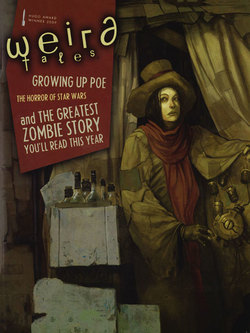Читать книгу Weird Tales #354 (Special Edgar Allan Poe Issue) - Simon King - Страница 10
На сайте Литреса книга снята с продажи.
ОглавлениеLEAKY GRAVES, by Ramsey Shehadeh
I’m standing on a small stage in a big classroom in Bethesda, Maryland.
I’m 17. A sparse crowd of teenagers, sprawled on folding chairs, are staring up at me with expressions that range from desperate boredom to mild, grudging shock.
I’m screaming at them.
Specifically, I’m screaming this:
“O God! what COULD I do? I foamed—I raved—I swore! I swung the chair upon which I had been sitting, and grated it upon the boards, but the noise arose over all and continually increased. It grew louder—louder—louder! And still the men chatted pleasantly, and smiled. Was it possible they heard not? Almighty God!—no, no?”
Which is to say, I’m giving a dramatic reading of The Tell-Tale Heart. The beating of the old man’s heart, buried with the rest of him beneath the floorboards, has finally pushed his murderer over the edge, and he will soon tell the police what he’s done. The performance calls for some mad eye-rolling, a little rending of clothes, loads of unhinged raving, and the occasional vigorous spate of lectern-pounding.
“They heard!” I wail. “They suspected!—they KNEW!—they were making a mockery of my horror!” Portions of my little audience are certainly making a mockery of something, but it isn’t my horror. The unfortunate girl sitting in the front row, well within spittle range of my acting spasms, has her head in her hand, and is trembling slightly with something that is not, I assure myself, laughter.
This is speech class, and we’ve been asked to give a reading from our favorite stories. I didn’t have to think too hard about what I wanted to do. Back then, Poe was my man. I had a giant omnibus edition of his collected work at home, and spent a really unhealthy amount of time poring over its myriad unpleasantnesses. The poems I mostly left alone, because poetry was for girls, but the stories were a revelation: a cramped suffocating claustrophobic revelation, yes, but nevertheless an endlessly fascinating window into the troubling depths of the human mind.
I didn’t give it much thought, then, but it seems in retrospect like an odd thing for a youngish person to be obsessed with. The trajectory of early life is defiantly outwards, a symbolic extension of that first escape from the womb. We spend a lot of time trying to get away from the inside of our own heads. But Poe’s fiction represents the exact opposite of this impulse. It’s relentlessly, pathologically, inward, peopled with characters who are forever burying each other in dark, improvised graves.
Graves that are, all too often, insufficient to the task. Whether it’s a stubbornly beating heart or a bricked-up cat or the dank subterranean pricklings of conscience, Poe’s internments always seem to be springing inconvenient leaks. It doesn’t matter if you take these stories at face value, or see in them the dark atrocities of a mind at war with itself: the inescapable message here is that we can’t rid ourselves of the worst aspects of our nature. Because those things aren’t just a part of us—they are us. Even if we succeed in hiding them from the world, we can’t hide them from ourselves.
“But anything was better than this agony!” I scream—feeling, now, that I’m speaking for the whole class, whose amusement has lapsed back into sardonic ennui. My strategy of substituting volume for insight seems to be failing, at least partly because this material really isn’t suited to bellowing—its claustrophobic brand of sensationalism is an interior thing, a crawling-into-your-own-head thing. It’s a dark funhouse mirror, reflecting the worst parts of all who read it.
So why on earth does anyone read it? Our culture’s preference for escapist fiction is pretty well-documented (in box office returns, if nothing else) and much of Poe’s stuff is anything but escapism. So what’s going on?
My guess is that we actually want to look in that mirror, if only to make sure that we don’t recognize too much of ourselves in it. There’s a definite there-but-for-the-grace-of-sanity dimension to the thrill you get from reading these stories. Which is, I think, the hallmark of all good horror. I’m as much a fan of Cthulhu-esque pandimensional abomination fiction as they next guy, but for real scares there’s nothing like the specter of the mind betraying itself. Because the worst demons—maybe the only demons—are the ones that live inside our skin.
“Villains!” I shriek, “dissemble no more! I admit the deed!—tear up the planks!—here, here!—it is the beating of his hideous heart!” Thus ends my dramatic reading.
There’s a brief silence, followed by perfunctory applause, all limned in a giant nimbus of desperate relief. I step off the stage, and go back to my seat. I chewed up about all the available scenery, which is a kind of accomplishment, I suppose—but otherwise the whole thing was a pretty mortifying failure. No acting career was launched that day.
Which I’m okay with, in retrospect. You don’t want to get too close to Poe. I’m quite content to stand back and admire his dark genius from afar. It’s a nice place to visit, as they say. But I wouldn’t want to be buried there.
* * * *
Ramsey Shehadeh splits his time between writing stories and writing software. He blogs at doodleplex.com.
